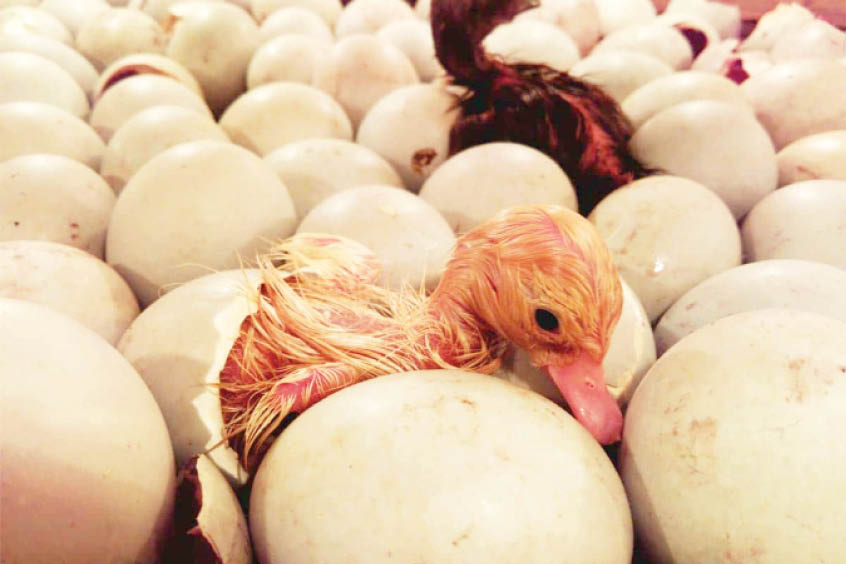Egg eating by hens is a habit which is extremely difficult, if not impossible, to break.
It is, therefore, important you manage your facilities so that the hens never taste a broken egg, according to Penn State University poultry experts. Prevention management practices include:
Reduce traffic in nesting area
Egg breakage is a major reason why hens start eating eggs. Excessive traffic and eggs in the nesting area increase the chances of egg breakage. Some precautions include are:
- Provide one 12” x 12” nest for every four to five hens in your flock. Never have less than four nesting boxes. Always locate the nests at least two feet off the ground and at least four feet away from the roosts.
- Discourage floor nesting. Identify dark corners and sheltered areas underneath shelving or objects. These may be more attractive to hens than nest boxes.
- Determine where the hens prefer to nest. A popular nesting space can quickly fill with eggs which may break against each other. If many hens continue to choose the same nest, increase how often eggs are collected throughout the day to prevent too many eggs in one space.
- Keep two inches of clean, dry nesting material in the nests at all times. Many eggs are cracked due to a lack of protective padding in nesting boxes. Some small producers will cut carpet pads and place them at the bottom of their nests to prevent breakage. However, these can easily become contaminated with bacteria and harbor mites if not removed and cleaned or replaced frequently.
- Remove all broody hens from the laying area. Broody hens reduce nesting space and cause more traffic in the remaining nests. Other hens may also lay their eggs where the broody hen is, increasing risk of breakage from too many eggs. Do not scare hens out of nest boxes. They may accidentally break eggs on their way out.
Nutrition
Eggs contain high-quality protein and fats that can be enticing to hens who are not already receiving proper nutrition. Provide a complete ration formulated to meet the needs of laying hens. Feed stuff like scratch grains and cracked corn are not appropriate on their own. It may be tempting to mix these with a complete ration to decrease costs, but this will dilute the ration, throw off the nutrient balance, and ultimately provide less of what the hens need.
Strong eggshells, which can be improved through nutrition, will help prevent egg eating by preventing egg breakage. To keep the shells strong, feed a complete ration and provide free-choice oyster shells or limestone as a calcium supplement. Do not mix extra calcium directly into the feed. Provide it in a separate pan that hens cannot climb or dust-bathe in, or top-dress a complete ration when needed.
Never feed the hens used eggshells without drying and smashing them to very fine particles. If the hen can associate the shell with the egg, she will be encouraged to pick at the fresh eggs in the coop.
Reduce stress
- Don’t use bright lights in your coops, especially near the nesting area. Bright light increases nervousness and picking habits.
- Don’t scare the hens out of the nesting boxes. The sudden movement can break eggs in the box, which can give the hens a taste of egg and promote egg eating.
Prevent egg eating by other animals
Predators such as snakes, skunks, rats, weasels, and others will eat eggs and leave egg residue which can cause your flock to develop a taste for eggs, too.
If your hens are eating eggs, they will usually have dried yolk on their beaks and sides of their heads. Holes pecked in eggs can be a sign of attempted egg eating. Egg eating hens can also be seen scouting the nests for freshly laid eggs to consume.
If you do catch an egg eater, cull her from the flock at once. Egg eating is a bad habit that will multiply the longer you let it continue. If one hen starts eating eggs, other hens will soon follow. Roosters can also become egg eaters.
Prevention is the only proven treatment. Collect eggs often and early in the day. Most hens will lay before 10am daily. The longer the eggs are in the barn, the better the chance they will break or be eaten.
Reviewed by Dr Paul Patterson, Department of Animal Sciences. Further review and editing by Ashley Bigge, Penn State Extension.
SOURCE: The Poultry Site

 Join Daily Trust WhatsApp Community For Quick Access To News and Happenings Around You.
Join Daily Trust WhatsApp Community For Quick Access To News and Happenings Around You.


